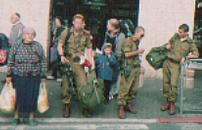
"Israel 2008" story # 16
WAR IN THE MIDDLE EAST
Tzfat, Israel
November 14, 2008
Many Israeli boys and women - some unrepentingly, and others sadly - have told me they simply don't read. Perhaps they, like I, came to dislike reading as a result of being told what to read in school? Perhaps their bookstores carry writers who have the influence and ambition to get books published, but lack originality?
Thankfully, I now read a lot, just like when I was a three-year-old whose Grandma Breen taught him to spell, "hippopotamus." Or was that, "hipoppotamus?" And I enjoyed reading a small childrens' story by Israeli writer, Oded Burla. It was called, "Ani Hoshev Miskashvim L'faamim." (I Think Deep Thoughts Sometimes.) In the story, a turtle, a lizard, a beetle, and a crow discussed their favorite seasons. They said they had dry and sunny thoughts in the summer; in the spring, they dreamt that the trees were purple and the ground red, and that some smells had colors; they had moist thoughts in the fall; in winter, they dreamed they saw paintings where the houses and forest and sky were all in gray.
Young Israelis who read a lot often prefer science fiction or fantasy to non-fiction. They're friendly people. They explain, "In Israel, we already have too much reality."
That's true.
Everybody commits the first three years of his/her adult life to the army.
During the last war, two years ago with Lebanon, missiles hit Tzfat and other northern towns.
Israelis and Palestinians have been feuding since 1948, when Britain granted control over a different part of the land to each party, and Palestine objected immediately.
Nowadays, the populace often worries and prays for lost soldiers, whom Hezbollah has captured and maybe killed.
Hmmm. Yeah. A lot of reality. Some people have give me first-hand or second-hand accounts of a reality more real than I'd like to know.
A Lebanese Christian named Hussein, who's lived in Israel about twenty years, said he used to be a general in his country. During Lebanon's Civil War of the 1980's, or during a separate revolt (I'm not sure which), Hussein was shot ten times. He said his friend's fingers were cut off by Hezbollah. Hussein now works as a security guard at Tzfat College. He and all other Lebanese (perhaps all of them Christians?) in Israel can never visit their homeland, because the border is obviously closed.
A young Israeli, Rufah, was the first to tell me of the Lebanese-Israeli War two years ago. His account was memorable because we were driving through the Negev Desert at night. Darkness surrounded the uninhabitable sand that surrounded us. It surrounded Rufah's beige skin. It surrounded the subject matter: soldiers crawling around southern Lebanon, killing or being killed. Israel had sent soldiers in promptly after discovering Lebanon had captured two Israelis patrolling the border. Rufah spoke respectfully of those he fought against - more respectfully than I would've expected, after having heard a few Americans talking about Iraqis. The most derogatory thing he said was that Hezbollah would sometimes bring cilivians into a building Israel was targeting because they hoped to be able to announce Israel was killing civilians.
Exactly nine days after I rode with Rufah going south towards Eilat, I was eager to return to Tzfat to camp with the jackals and take a pause from story-selling.
Traveling north from Jerusalem and Tel Aviv, I got picked up by a red-haired Jew. (Shame on me, I've forgotten the good soul's name.) He hadn't fought in Lebanon. But, he said his girlfriend's younger brother had. And he'd been a young officer, in charge of even younger soldiers. He doesn't talk about it, but the experience has changed him. My driver estimated that, nowadays, 25% of the time, the young boy leaves dinner and immediately vomits.
Yohav picked me up after the red-haired guy. "You got a good ride," the brown-skinned twenty-six-year-old said. He was going to Tzfat.
On a jammed highway, he talked about Lebanon.
Four friends from his squadron had been killed there. He'd had a hole blown into his face. They'd been hit on the last night Israeli soldiers were in Lebanon. They'd decided to sleep in a seized building, rather than in the forest - a questionable decision they weren't allowed to question. The building got bombed in the night.
Yohav's face is all better now. A proud guy, he admitted Israel had lost the war. She'd gathered forces too quickly, forgotten equipment; Israeli soldiers hadn't been ready for the guerilla warfare Hezbollah had thrown at them.
When we got to Tzfat, Yohav was hugged by a worker of young Yohav's landscaping business. This worker had white skin, and shaggy, curly dark hair like a loveable dog's.
I would learn that he, too, had an interesting story.
Named Liyel, he had two tattoos of doves. When he'd been seventeen, he refused to enlist. "I'm not a fighter," he said. "I want to be a magician." He said he'd do magic shows for the troops. He'd sit in jail for three years. But, he wouldn't join the army. Eventually, they let him go.
A lot of Israelis are probably mad at Liyel. At least - unlike a very small group of people who fake a health problem or pretend they're religious to avoid military service - he'd been honest. He can be proud about that.

shalom,
Justin
Much thanks to Ran for the place to stay in Tel Aviv again.
Thanks to Asaf; Shimon; Zahar; red-haired guy; and Yohav for rides!